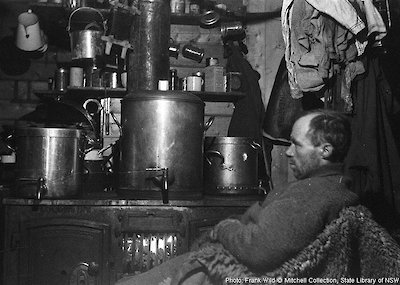Alone on the ice shelf
All alone here now and the silence is immense.
So wrote Moyes in his diary on 7 November 1912, the day the Western party departed to leave him alone at the Grottoes. He knew nothing of Wild’s change of plan. All he knew was that Harrisson would be turning up in a couple of weeks to keep him company into the summer, until the two sledging parties returned.
So he began his lonely vigil — a routine of weather observations, keeping the stove burning, cooking, reading. And walking little distances when weather permitted.
After a month, he knew that a returning Harrisson would be nearing the end of his food. Fearing a mishap, Moyes set off with a sledge in the direction of the Hippos, as had been arranged in the event of Harrisson’s non-return.
He had reached Henderson Island, two-thirds of the distance to the Hippos, when a windstorm severely hindered him in raising his tent. Affected by snow-blindness, he was forced to return to the Grottoes, being lucky to escaping a crevasse fall en route.
The Silence is so painful now that I have a continual singing in my left ear, much like a Barrel Organ, only it’s the same tune all the time.
So wrote Moyes on 20 December 1912, looking forward to a lonely Christmas. The lack of human companions was beginning to take its toll. He was now a regular visitor to the sea ice at the base of the ice cliffs, where he talked to a group of emperor penguins which stayed a while during their moulting.
Early in the New Year — 1913 — things were looking truly desperate. Moyes had now been alone for nearly two months. He had reason to believe that Harrisson had died, and harboured the inevitable fear that neither of the two main sledging groups would return, making him the sole survivor of the Western Party. He felt, he wrote in his diary, ‘like the last leaf of a branch’.
Then suddenly, on the morning of 6 January, he heard voices singing a marching tune. He rushed out of the Hut to see an approaching Eastern party. He counted the figures — one, two, three … four — to find that Harrisson was alive and well. He would have been justified in expressing some resentment, but his only recorded reaction, as noted by Harrisson, was unbounded joy at the return of his friends.
Wild noted that ‘after his lonely nine weeks’ Moyes looked well. ‘But [he] said that it was the worst time he had ever had in his life.’
The story of the stay-at-home Moyes has never quite made it into polar legend. But in his own quiet, solitary way he was a true Antarctic hero.

